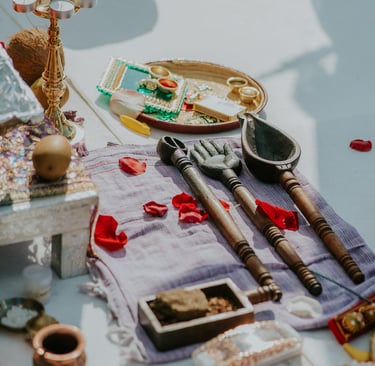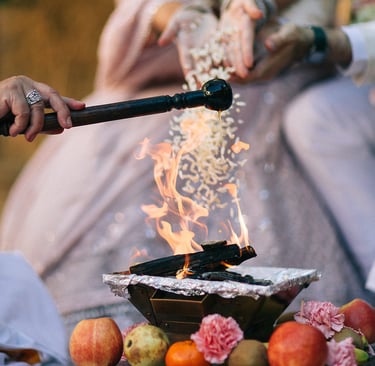Do’s and Don’ts for a Hindu Wedding
By Pandit Krishna Kripa Dasa (aka JC Ramchandani)
We have conducted and directed over 350 Hindu weddings over the past 30 years. The following do’s and don’ts are based on our experience and feedback from the couples and families we have worked with. Because there are many things to manage, organizing this event can be stressful. We hope the guidelines below help you plan a successful and enjoyable wedding.
Venues
A hotel banquet hall or function center is the most suitable for traditional Hindu weddings. A small wedding can be held at home, if space allows.
Temples are not suitable unless ceremonies take place in adjacent halls. Weddings are a human sacrament with no invocation of the temple deity (except Ganesha). Using a temple is like using someone else’s home without inviting them. Additionally, the bride and groom are revered as embodiments of Vishnu and Lakshmi on their wedding day and worshipped as such only the consecrated deity may be worshipped within the temple sanctuary. If a temple is
used, the shrine must be closed or the curtain drawn during the ceremony.
Outdoor garden venues are popular but traditional Hindu weddings require a covered mandap. Gardens may be romantic and picturesque but have challenges: weather unpredictability, shade logistics, and fire restrictions. The sacred fire must remain central to the ceremony always have a backup indoor option.
Boats are not suitable for a traditional Hindu wedding. Shastras do not allow establishing a sacramental fire over water, and the boat’s movement disrupts the ceremony’s solemnity.
Do´s
Decide between traditional or pragmatic ceremony
Choose the style—long orthodox (up to 3 hours) or shorter, customized with explanations in English. Select your priest to match your preferences.Focus on meaning, not method
Rituals may vary across traditions. Concentrate on the spiritual rationale behind them, and let your priest customize accordingly.Plan jointly with both families
Cultural, religious, and generational differences may create tension. Resolve issues in advance and ensure unified planning.Contact your priest well in advance
Reach out 9–12 months before your proposed date. We can advise on timelines, logistics, stage setup, chupah placement, and more.Respect all appointments and schedules
Everyone is busy. Stick to timelines, inform if delays occur, and show respect through punctuality.Delegate locally
Assign specific responsibilities to trusted friends or family who understand the program, timelines, and required items. Ensure hosts have minimal tasks on the wedding day.Host everything at one venue
Ideally, ceremony, reception, catering, and lodging should be in one location—a full-service hotel or villa—to minimize logistics and stress.Choose a visible Mandap
Use an open Mandap on a raised stage. Ensure a canopy protects participants from sun or rain.Inform guests of the solemn nature
Include start times earlier than printed (e.g. “10:00 for 10:30”) and request silence, phone-off, and seating kids at the back.Provide all ritual items two hours in advance
Assign a coordinator to oversee procurement and delivery. Make sure every item’s purpose is understood.Create a serene atmosphere
The mantras require devotion and calm surroundings. Set up theatre-style seating so guests are seated and attentive.Clarify fire rules with the venue
Sacred fire (Homa) is essential. Get permission for indoor ceremonies and hot to turn off alarms during the ritual safely.Use discreet photography and videography
Ask guests to take photos from their seats. Professionals should not enter the Mandap or disrupt rituals.Hire a knowledgeable DJ
A DJ familiar with Hindu weddings can support sound cues and offer discreet wireless mic access for the Pandit.Prepare a proper Dakshina
Have the agreed honorarium in an envelope ready at the ceremony’s end. Consider offering a shawl or kurta if culturally appropriate—confirm sizes in advance.




Don't
Don’t assume you need to spend a lot on the priest
Priests dedicate their lives to serving the Hindu community. Please provide vegetarian meals and good rest accommodations. Most income comes from the dakshina.Don’t procrastinate
Last-minute planning leads to chaos. Schedule everything well before the event.Don’t request ritual changes after the deadline
Unplanned additions from guests should be communicated at least 10 days before the wedding, not on the day.Don’t serve food during the ceremony
Out of respect and to maintain sanctity, no food should be served. Water bottles are acceptable if necessaryDon’t arrange seating around tables
Theater-style seating (semi-circle around the Mandap) allows guests to witness rituals without distraction.Don’t separate events too far apart
Multiple venues create delays and coordination issues. Keep wedding events close to each other and to guest accommodations.Don’t let musicians dominate the ceremony
Traditional musicians should play background music. No amplifiers or solos during vows or explanations. Professionally familiar with Hindu weddings is best.
Do’s and Don’ts for a
Hindu Wedding
By Pandit Krishna Kripa Dasa
(aka JC Ramchandani)
We have conducted and directed over 350 Hindu weddings over the past 30 years. The following do’s and don’ts are based on our experience and feedback from the couples and families we have worked with. Because there are many things to manage, organizing this event can be stressful. We hope the guidelines below help you plan a successful and enjoyable wedding.
Venues
A hotel banquet hall or function center is the most suitable for traditional Hindu weddings. A small wedding can be held at home, if space allows.
Temples are not suitable unless ceremonies take place in adjacent halls. Weddings are a human sacrament with no invocation of the temple deity (except Ganesha). Using a temple is like using someone else’s home without inviting them. Additionally, the bride and groom are revered as embodiments of Vishnu and Lakshmi on their wedding day and worshipped as such only the consecrated deity may be worshipped within the temple sanctuary. If a temple is used, the shrine must be closed or the curtain drawn during the ceremony.
Outdoor garden venues are popular but traditional Hindu weddings require a covered mandap. Gardens may be romantic and picturesque but have challenges: weather unpredictability, shade logistics, and fire restrictions. The sacred fire must remain central to the ceremony always have a backup indoor option.
Boats are not suitable for a traditional Hindu wedding. Shastras do not allow establishing a sacramental fire over water, and the boat’s movement disrupts the ceremony’s solemnity.
Do´s
Decide between traditional or pragmatic ceremony
Choose the style—long orthodox (up to 3 hours) or shorter, customized with explanations in English. Select your priest to match your preferences.Focus on meaning, not method
Rituals may vary across traditions. Concentrate on the spiritual rationale behind them, and let your priest customize accordingly.Plan jointly with both families
Cultural, religious, and generational differences may create tension. Resolve issues in advance and ensure unified planning.Contact your priest well in advance
Reach out 9–12 months before your proposed date. We can advise on timelines, logistics, stage setup, chupah placement, and more.Respect all appointments and schedules
Everyone is busy. Stick to timelines, inform if delays occur, and show respect through punctuality.Delegate locally
Assign specific responsibilities to trusted friends or family who understand the program, timelines, and required items. Ensure hosts have minimal tasks on the wedding day.Host everything at one venue
Ideally, ceremony, reception, catering, and lodging should be in one location—a full-service hotel or villa—to minimize logistics and stress.Choose a visible Mandap
Use an open Mandap on a raised stage. Ensure a canopy protects participants from sun or rain.Inform guests of the solemn nature
Include start times earlier than printed (e.g. “10:00 for 10:30”) and request silence, phone-off, and seating kids at the back.Provide all ritual items two hours in advance
Assign a coordinator to oversee procurement and delivery. Make sure every item’s purpose is understood.Create a serene atmosphere
The mantras require devotion and calm surroundings. Set up theatre-style seating so guests are seated and attentive.Clarify fire rules with the venue
Sacred fire (Homa) is essential. Get permission for indoor ceremonies and hot to turn off alarms during the ritual safely.Use discreet photography and videography
Ask guests to take photos from their seats. Professionals should not enter the Mandap or disrupt rituals.Hire a knowledgeable DJ
A DJ familiar with Hindu weddings can support sound cues and offer discreet wireless mic access for the Pandit.Prepare a proper Dakshina
Have the agreed honorarium in an envelope ready at the ceremony’s end. Consider offering a shawl or kurta if culturally appropriate—confirm sizes in advance.
Don’t assume you need to spend a lot on the priest
Priests dedicate their lives to serving the Hindu community. Please provide vegetarian meals and good rest accommodations. Most income comes from the dakshina.Don’t procrastinate
Last-minute planning leads to chaos. Schedule everything well before the event.Don’t request ritual changes after the deadline
Unplanned additions from guests should be communicated at least 10 days before the wedding, not on the day.Don’t serve food during the ceremony
Out of respect and to maintain sanctity, no food should be served. Water bottles are acceptable if necessaryDon’t arrange seating around tables
Theater-style seating (semi-circle around the Mandap) allows guests to witness rituals without distraction.Don’t separate events too far apart
Multiple venues create delays and coordination issues. Keep wedding events close to each other and to guest accommodations.Don’t let musicians dominate the ceremony
Traditional musicians should play background music. No amplifiers or solos during vows or explanations. Professionally familiar with Hindu weddings is best.


